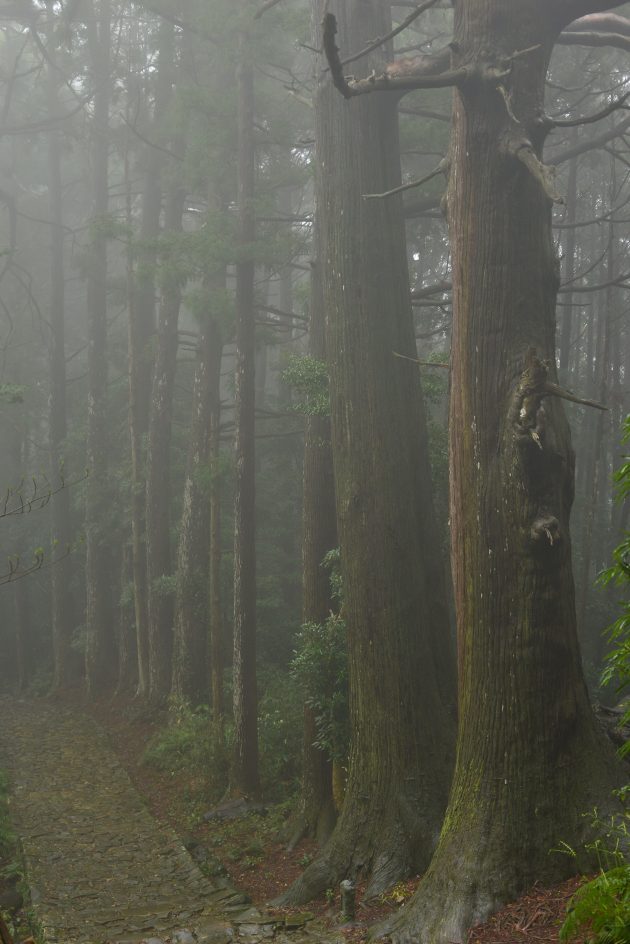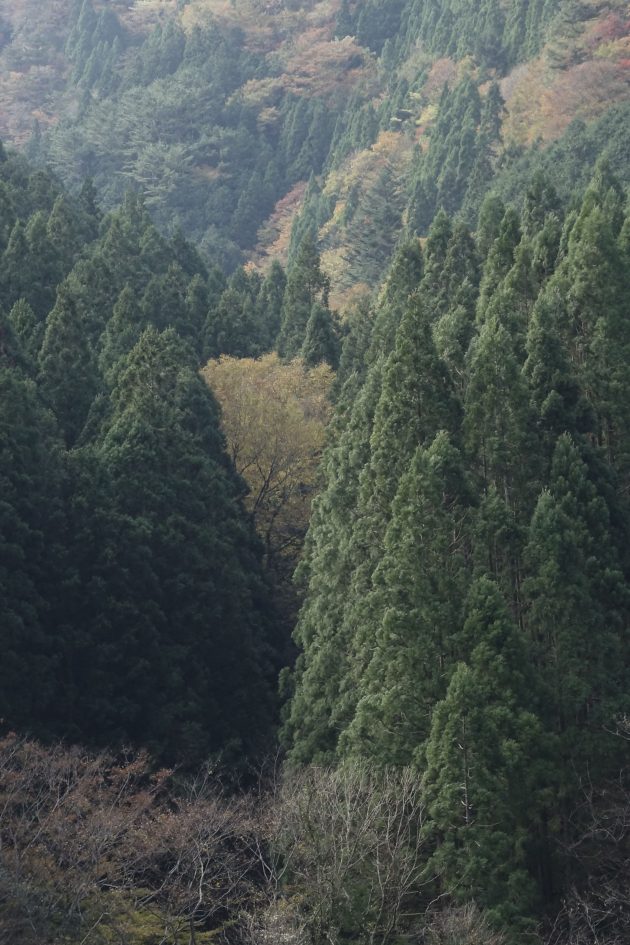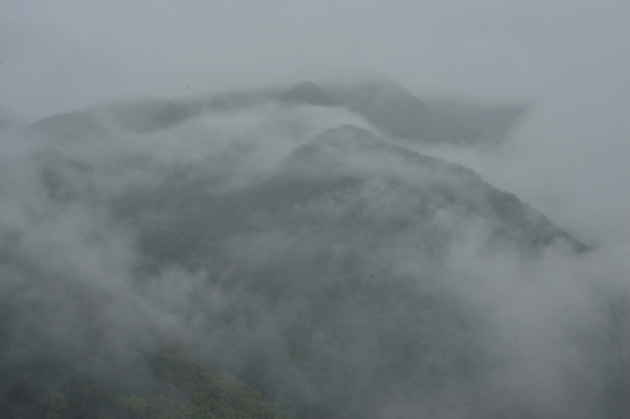[T]he old man sat gazing out on summer mountains stacked beneath a white sky, the heated masses of green and blue-green resolving themselves back into the more distant layers of brown and beige and dove gray before leaching away finally into a pale wash of heat haze. His road companion — a youth postponing the burdens of adult responsibility — scowled petulantly at him, as if to question how long they would be perched here in this wilderness of mountains and sky and how far they would have to walk before they could stop and sit down again, both conditions displeasing to the boy.
The old man removed his round travel hat and dried his face and head with a clean white cloth then picked up his hat again and fanned himself with it, the chin cords dangling. He and young Chibi-kun were dressed alike in the summer robes of wandering monks. Each wore a woven hemp travel satchel and sleeping quilt tied diagonally across one shoulder, and each had a water gourd suspended from his obi sash. Their hands and forearms were darkened from the summer sun, summer road dust coated their feet and ankles.
You must be tired, the old man said; and Chibi-kun looked away and said nothing, the better to enjoy feeling sorry for himself.
They had shaved their heads on the day of their departure, shaved them again after twenty days on the walking road, and the stubble now was of a length that made the old man long for the bite of a fat-blade razor. His hardwood staff held a cluster of rice-straw sandals attached at the top like pompoms on a halberd while Chibi-kun was outfitted with a woven bamboo back-toter for the utensils they required, and the boy had various prophylactic amulets tucked away here and there on his person as a defense against goblins and water sprites. Although the old man’s birth-status allowed him to wear the two swords of a samurai, he would permit neither of them to carry a weapon, much to his companion’s chagrin.
Shall we continue?
I am too tired.
You wish to stay here?
Here? The boy looked around and assessed their surroundings or pretended to. This is a terrible place.

The old man drank from his water gourd then replaced the stopper, screwing it down into the gourd-mouth tightly. He tied on his sun hat and readjusted his equipment — the shrilling of cicadas all around them loud enough to pierce stone — then hitched up the hem of his summer robe, secured the front flap of it under his obi sash in the manner of old-style foot-pilgrims and set off walking again.
The boy ignored his departure. He studied his pink toes. But when the old man rounded a bend and didn’t look back, Chibi-kun jumped up and scurried after him. Wait, can’t you! he cried. Such discourtesy!
The path they followed led up into a dense cedar forest. It was wide enough for walking men to pass each other without loss of dignity, or even for men on horseback to manage it; but if two palanquins met, one would have to yield to the other, and even in this era of the Shogun’s Great Peace, such encounters were fraught.
We should have gone another way.
There was no other way.
Then we should have found one!
The old man continued climbing steadily uphill through the heat of the day, ignoring the boy and his dissatisfactions.
Chibi-kun was a child of new times. Clever with words, a precocious literary prodigy, he was the youngest of the old man’s linked poetry disciples and much favored by him. During formal group sessions, the fertility of his imagination would send the boy flying past his more cautious elders, and he would burst out with suggestions even when it wasn’t his turn. Creating solitary sequences was more satisfying for the boy, and what delighted him most was the rapid-fire composition of a single-poet sequence before an audience of admirers. Modern linked poems were composed of thirty-six stanzas, each building off the one before; but Chibi-kun so trusted his own vitality that he would take on the traditional hundred-stanza sequence and even the occasional thousand-stanza effort, audaciously tossing off link after link so that even two scribes with quick brushes would have to scramble to keep up with him.
The boy never rewrote. What audience ever cared to sit through the process of a revision? These tedious old plodders struggling to choose between ‘winter drizzle’ and ‘wintery gusts’ left him gasping with impatience. And although Chibi-kun loved the bustle of the new cities of Edo and Osaka and Sakai, with their theaters and teahouses and the salons of rich merchants, what suited him best were the lush pleasure gardens of powerful daimyo warlords, where his charm and inventiveness could be savored at leisure by himself and others. These wild northern mountains were disagreeable to the boy — nothing at all like the screen paintings of them that he admired — and he stumbled along unseeingly, thinking only of what he would say at his next opportunity to extend the range of his disappointments.
The two walkers continued up through the shadowy forest, their footsteps muffled by a thick duff of dry cedar branchlets so that the old path resembled the course of a hillside stream made rufus with silt. Even the incessant screech of cicadas seemed muted here by the wet heat and weight of the closely-spaced cedars.
They rounded a bend to discover a landslip spill of raw boulders blocking their path, like a tumble of petrified dragon scat rolled down out of the mountainside and leaving a long, ragged gash in the red soil. Look at this mess! Chibi-kun cried. What a nuisance! The drop-off was steep and they were obliged to negotiate the obstruction with care, loose scree giving way under their feet and rattling like hailstones into the vegetation of the gorge far below. Who is responsible for maintaining this road?
Mountain bogeys, said the old man. Hopping goblins with long red noses.
No doubt hoping for a poem from you, the boy muttered, intentionally climbing over a large boulder instead of taking the easier way around it.
Ogres and bogeys were real to the boy because of his own heightened sense of self-worth. For Chibi-kun, every event, every happenstance — no matter how remote — could be connected to him by the jewel-cord of a karmic irrevocability so that if a sea-fiend were known to have victimized some unfortunate wretch on a fishing boat far out on the Inland Sea, it was nevertheless still somehow Chibi-kun himself who must have been the weird malignancy’s ultimate concern, and the shudder of compassion that the boy felt was always unwaveringly personal.

The two walkers continued uphill in silence. The cedar forest thinned as they climbed, and the ferns and clumps of wild orchids that thrived in the sun flecks of filtered light gave way to sturdy patches of dwarf bamboo grass and open declivities so choked with mahonia that they had to push their way through masses of prickly branches hung with shiny purple-black berries, glistening like death’s own seeds in the windy sunlight.
You cannot eat those, the old man cautioned, always willing to be helpful when help wasn’t needed; and the boy made no response, hoping the old fellow might worry that he had done so already.
The terrain became increasingly rocky, and a jay trailed them from tree to tree, squawking in outrage at this invasion. The trees grew more sparse and they crossed through an area of exposed rock that extended under the summer sky like a gods’ platform, the gray expanse of it sun-flattened, wind-hammered, encrusted with lichens and gripped by a few stunted pines with thick roots fitted down into crevice fractures for the life to be found there. They rounded a sweeping curve with their robe-sleeves flapping and came onto a broad shelf of naked granite that was thrust out over the void like an immense stone fist striking the empty air.
What! We have to stop again?
The old man found a smooth spot and sank down facing the opposite slopes, the shimmering fabric of cedars and cypresses splashed here and there with brighter patches of summer maples and camphor trees, the whole of it rising up in a steep green verticality that undulated beneath the combing fingers of the wind like the flapping of an immense virid sail.
The boy sat down beside him. These mountains all look the same.
The old man opened his travel pouch and removed a roll of rice paper. He lifted out his writing kit—a bronze tube ending in a bulbous bronze pot fitted with a tight lid, like a metallic leek with a metallic ball-onion fused on at one end. The tube held his writing brush, and the onion-pot was stuffed with wadded cotton fibers soaked with ink.
He sucked briefly on the dried tip of his brush to soften it, leaving a black smudge on his lips, then unrolled the paper scroll until he found where he had left off. He stared out at the wind-flow on the flanks of the mountains, with the heat of the sun on the granite and the tumbling rush of a stream in the gorge far below; then he brush-wrote a couplet of parallel five-character lines in Chinese:
Green upon green, the summer mountain wind;
Farther and farther, the broadleaf plantain at my hut.
He studied what he had made then looked up. The wind gusted stronger as he watched, and the summer forests tossed and trembled as the mountains reached out for each other, as if the wind rose of itself solely to sluice away the world’s maundering.
Can we go yet?
I thought you were tired.
Of course I’m tired!
Then you should rest more.
A furious rattling erupted in the gorge below as a troop of foraging apes burst out of the stream-side bamboo like flung gravel. They landed screeching, baring their fangs and launching reprisals in all directions although nothing beyond their own tumult seemed to be threatening them. They leapt and fell and interfered with each other, beasts too volatile to settle on any strategy so that moments of advantage gained by one were lost immediately to another. The apes finally scattered out of sight, spun away by the centrifugal force of their own agitation, the residual chaos of a few stragglers indicated by abrupt and unseen collisions within bushes and groves.
The old man returned to his writing. He composed a phrase in their own language, the words connected each to the next in a single, sinuous line of ink that swept down with casual ease:
A summer gale in the mountains, and the wild monkeys also struggle to find shelter.
Next to this he wrote:
A summer downpour in the mountains, and the wild monkeys also seem to want little rain capes.
He studied this line for a moment then blotted out the words A summer downpour in the mountains, hatching across each character with strokes like bird-tracks in snow.
Now can we go?
The old man gazed out at the flowing mountains before him then brush-wrote The first drizzle beside the opening phrase he had effaced, and after a moment he added next to it A winter shower then next to that Freezing sleet.
Why are you doing all that?
I will need ideas.
Those are winter images. You cannot use them for an opening stanza made in summer.
I know it. But even in summer, mountains feel like a place of winter to me.
To me, they are just an inconvenience.
The old man pondered the phrases he had made then scraped the ink residue off his brush by drawing it backwards along the surface of a rock to maintain the integrity of the tip. He re-rolled his scroll, scanning through it as he did so. He was known everywhere as the Old Master of the Plantain Cottage, and he was a man who cherished the words he used to describe the occurrences of the world as they emerged yet who also distrusted this fondness so that the phrases he devised often left him dissatisfied. There was no remedy for it. He would assemble variations even as he recognized the folly of his desire to determine somehow the one perfect way of saying what in his heart he knew could never be said.
You get past one mountain and there’s another one, Chibi-kun declared peevishly. Like it was waiting for you.
What the Old Master wished was to make things out of words that could be placed beside things made by men of the past and deserve to be there with them. He had taken other long walking journeys through remote provinces in order to go where they had gone and test himself against the austerities they had endured. But what he found always was that his celebrity reached into areas he had never even heard of, and access to the world of the men of the past became buried beneath the importuning of those living in the present. There was no help for it. Wherever he went, he encountered rural magnates who insisted on entertaining him for as long as he could be persuaded to stay with them. They would invite other rustic aesthetes to participate in thirty-six stanza sessions under his guidance then afterwards fill the afternoons and evenings with feasting and singing so that the holy silence of the mountains rang loudly with their celebrations of it.
The Old Master slid his writing brush into the tube holder and fitted the cap back onto the ball-onion ink pot.
You cannot start a linked poem in summer with a winter image! Chibi-kun cried, scowling, casting about for a way to connect one disappointment to another. And you will surely be asked to lead a group in the next castle-town. Causing us more delays. He stared petulantly at his own dust-covered feet. More waiting, more tedium. He thought about it. More dirty old fingers pulling on me.

The path climbed higher and curved back under the sheer expanse of an up-flung face of granite. The two walkers passed through the cool blue shadows of the cliff-side without pausing and re-emerged into the afternoon sunlight. A hawk tilted high above them, adjusting itself with the delicacy of an unconsidered skill, its easy grace like what the Old Master hoped to find in his own writing; and at the next bend they came upon a mountain quince, stunted and gnarled, and with only a spattering of red-orange blossoms still glowing on it like discs of fire. A child’s skeleton lay beneath the lower boughs of the old tree, the collection of small bones arranged within scraps of faded cloth like objects meant for such display. The Old Master drew closer. His shadow fell across the child’s skeleton, and he quickly moved to one side to avoid the profanation.
Why’s that like that? Chibi-kun demanded.
I don’t know. Lush tufts of summer grass sprouted up among the curved ivory bows of the child’s rib box. Probably he died here.
I told you this wasn’t a good way!
The little skull’s jawbone was missing; and the bowl of the skull had twisted off to one side, as if when entering onto his death-glide the child had wished to view something other than what he had been seeing.
The Old Master knelt beside the bone scatter. He removed his travel hat then bent forward to observe what proved to be a handful of mouse pups nestled within the cup of the brain case, pink and hairless little newborns, their eyes unopened, tiny perfect toes, tiny tails like curved pink filaments, lovely little breathers without blemish sleeping safely in there, bedded on shreds of the dead child’s garments which had been dragged inside by mouse parents intent on the comfort of their progeny.
There’s something written there, Chibi-kun said, on a scrap on the leg bone, unwilling to touch what he had found.
Words had been inked onto a piece of cotton fabric that was attached with a hemp cord to the dead child’s tarsus.
The Old Master was concerned with the explanations men devised to soothe themselves because he himself needed soothing; and he read out the declaration that had no doubt been dictated by starving parents to some local priest or other mountain literate, asserting that this child abandoned here by the roadside was a good child, obedient and loved, and that he had been relegated to this desolation through no fault of his own but simply because he was the weakest member of a despairing family that was bereft of all hope for salvation. Whosoever wanted him was hereby authorized to adopt him as their own. The child would answer to the name ‘Saburō’ although another name could be attached if his finder so preferred.
Do you think they really believed someone would take the child?
Perhaps they tried to believe it.
Could they have just walked away? Chibi-kun was outraged by it. With the child’s sobs in their ears? Could a mother do that? Turn her back? With the little child holding out his little arms and pleading to be picked up and carried with them?
The Old Master remained as he was. I don’t know.
A wretched place to die, Chibi-kun said, letting his anger become disgust and his disgust become scorn. These wretched people, these stupid ugly victims that die so easily…
But the Old Master only reached out and took the red-orange blossoms of the child’s quince in his hand, holding it for a long moment and gazing down at the beauty of the fiery orange discs blazing there in the windy sunlight with all the hope and folly of being.

Author
John Givens
Author's Bio
Native Californian John Givens got his MFA from the Iowa Writers’ Workshop, was a Peace Corps Volunteer in South Korea for two years, studied art and language in Kyoto for four years, and worked in Tokyo as a writer and editor for eight years. Givens’ novels: Sons of the Pioneers, HBJ; A Friend in the Police, HBJ; and Living Alone, Atheneum. A short story collection, The Plum Rains, has just been published in Ireland by The Liffey Press.
Credits
Photos by John Einarsen


